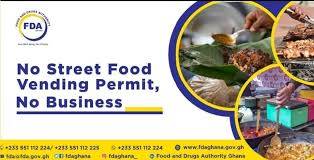WARNING: FDA Cautions Ghanaians Against Buying Food from Unlicensed Street Vendors
Why You Should Avoid Buying Food from Unlicensed Street Vendors in Ghana
Street food is a staple in Ghana. From waakye to kelewele, roadside vendors serve some of the most delicious meals. But while the aroma of grilled tilapia or the sight of steaming jollof rice may be tempting, have you ever stopped to think about where your food comes from and how safe it is?
The Food and Drugs Authority (FDA) of Ghana has issued a strong warning to consumers about the dangers of buying food from unlicensed street vendors. If you value your health and well-being, this is information you cannot afford to ignore.
What Is the FDA’s Warning About?
The FDA has expressed concerns that many unlicensed street food vendors operate without proper health certifications. This means they may not adhere to essential hygiene and food safety standards, putting consumers at risk of foodborne illnesses.
Authorities have noticed a rise in cases of food poisoning and gastrointestinal infections linked to consuming food from unregulated sources. By purchasing food from these vendors, you could unknowingly expose yourself to harmful bacteria, viruses, and even chemicals.
Why Street Food in Ghana Can Be Dangerous
Street food is a convenient and affordable option for many, but without proper food safety measures, it poses significant risks. Here are the major concerns:
1. Poor Hygiene Practices
One of the biggest challenges with unlicensed vendors is poor hygiene. Many vendors lack access to clean water, soap, and proper sanitation facilities. This can lead to:
Cross-contamination between raw and cooked foods
The spread of bacteria due to dirty hands and utensils
Use of unclean water for cooking and washing ingredients
2. Food Contamination
Food sold in open-air environments is exposed to dust, flies, and pollution. Contaminants from vehicle emissions, sewage leaks, and unhygienic food handling can lead to serious health issues such as diarrhea, typhoid, and cholera.
3. Expired or Low-Quality Ingredients
To maximize profits, some unlicensed vendors use expired, low-quality, or even fake food ingredients. These products may contain dangerous chemicals or additives that could lead to long-term health problems.
4. Lack of Proper Food Storage
Perishable foods like meat, fish, and dairy need proper refrigeration to prevent spoilage. Many street vendors do not have refrigeration systems, increasing the risk of foodborne illnesses caused by bacteria like Salmonella and E. coli.
Health Risks of Eating Unregulated Street Food
If you frequently consume food from unlicensed vendors, you may experience the following health issues:
- Food Poisoning
Symptoms include nausea, vomiting, diarrhea, stomach cramps, and fever. Severe cases can lead to dehydration and hospitalization.
- Typhoid Fever
Caused by bacteria found in contaminated food and water, typhoid can lead to prolonged fever, weakness, abdominal pain, and even death if untreated.
- Cholera
A major health concern in Ghana, cholera spreads through contaminated food and water, causing severe diarrhea and dehydration.
- Hepatitis A
This viral infection affects the liver and spreads through contaminated food and drinks. It can cause fatigue, jaundice, and long-term liver complications.
How to Identify Safe and Licensed Food Vendors
The good news is that you don’t have to give up street food entirely. Here are some ways to ensure you’re buying from a safe and licensed vendor:
1. Look for an FDA Certification
Licensed vendors should have an FDA-approved certificate displayed at their food stand. If there is no visible certification, ask the vendor about their food safety compliance.
2. Observe Cleanliness
Pay attention to the vendor’s hygiene. Are they handling food with clean hands? Do they have covered trash bins? Are the cooking and serving areas free from flies and dirt?
3. Check for Proper Food Storage
Fresh food should be stored separately from cooked food, and perishable ingredients should be kept in coolers or refrigerators. If the vendor does not practice proper food storage, reconsider your purchase.
4. Buy from Vendors in Regulated Markets
Many local markets have designated food vending areas where hygiene is monitored. Vendors operating in these spaces are more likely to follow health and safety regulations.
What the Government Is Doing to Improve Food Safety
The FDA, in collaboration with the Ministry of Health, is working on strengthening food safety regulations. Some of their initiatives include:
Public awareness campaigns to educate people about foodborne diseases
Strict monitoring of food vendors to ensure compliance with hygiene standards
Training programs for food handlers to promote safe food preparation practices
The government is also considering stricter penalties for vendors who fail to meet food safety requirements.
Final Thoughts: Choose Your Food Wisely!
While street food is an essential part of Ghana’s food culture, your health should always come first. Unlicensed street vendors may offer tempting meals, but the risks far outweigh the convenience.
By choosing licensed vendors and paying attention to hygiene standards, you can enjoy your favorite street foods without compromising your well-being. Spread the word and encourage others to prioritize food safety!
Would you like more tips on staying healthy in Ghana? Share this post and let’s create awareness together!



No comments yet
Be the first to share your thoughts!